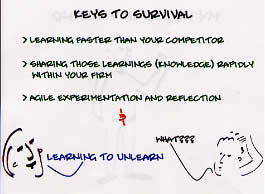|
|
Katalina Groh, Larry Prusak: Some of the world's leading thinkers |
| Storytelling: Scientist's Perspective: John Seely Brown |
 |
Learning
to unlearn
The curious thing is that with these exponential changes, so much of what we currently know is just getting to be wrong. So many of our assumptions are getting to be wrong. And so, as we move forward, not only is it going to be a question of learning but it is also going to be a question of unlearning. In fact, a lot of us who are struggling in large corporations know first hand that the hardest task is to get the corporate mind to start to unlearn some of the gospels that . |
| have made them successful in the past
and that no longer will actually work in the future
It turns out that this learning to unlearn may be a lot trickier than a lot of us at first think. Because if you look at knowledge, and look at least two different dimensions of knowledge, the explicit dimension and the tacit dimension, the explicit dimension probably represents a tiny fraction of what we really do know, the explicit being the concept, the facts, the theories, the explicit things that live in our head. And the tacit turns out to be much more the practices that we actually use to get things done with. In fact we need to think about the brilliant distinction that Bruner created some time ago called ďlearning to beĒ. Itís easy to learn about something. The tacit is learning to be. There is a tremendous difference between reading a physics book and knowing all the laws of physics. It is something else to being a physicist. And learning to be is what we are talking about when we are talking about this tacit game. Now the problem is that an awful lot of the learning that we need to do is obviously building up this body of knowledge, but even more so the unlearning that we need to do has to do with challenging the tacit. The problem is that most of what we need to do lies in the tacit, most of us canít easily get a grip on. It is very hard to reflect on the tacit because most of what is tacit, you donít even know that you know. And in fact, as I am going to show you in a second, what you do know is often just dead wrong. And it is almost impossible to change your beliefs about something that is in the tacit and is different from what you happen to think. |
| Books and videos on storytelling *** In Good Company : How Social Capital Makes Organizations Work by Don Cohen, Laurence Prusak (February 2001) Harvard Business School Press *** The Social Life of Information, by John Seely Brown, Paul Duguid (February 2000) Harvard Business School Press *** The Springboard : How Storytelling Ignites Action in Knowledge-Era Organizations by Stephen Denning (October 2000) Butterworth-Heinemann *** The Art of Possibility, a video with Ben and Ros Zander : Groh Publications (February 2001) |
| The views expressed on this website are those of the authors, and not necessarily those of any person or organization |
| Site optimized in 800x600: webmaster CR WEB CONSULTING |
|
|
|
|